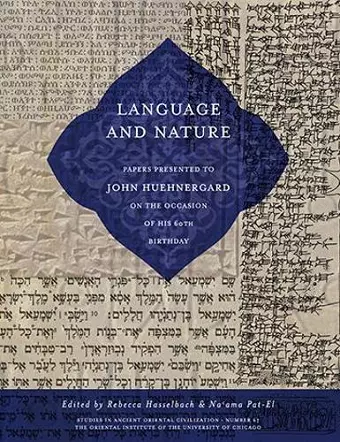Language and Nature
Papers Presented to John Huehnergard on the Occasion of His 60th Birthday
Na’ama Pat-El editor Rebecca Hasselbach editor
Format:Paperback
Publisher:Institute for the Study of Ancient Cultures
Published:31st Mar '12
Currently unavailable, and unfortunately no date known when it will be back

This book includes thirty contributions - twenty-nine papers and one artistic contribution - by John's colleagues, former students, and friends, on a variety of topics that represent John's versatility and many interests, including philology, history, natural history, and art.
Many of the papers concentrate on the Akkadian speaking world, reflecting one of the major languages John Huehnergard has worked on throughout the years. Eran Cohen reviews and discusses the functional value of Akkadian iprus in conditional clauses in epistolary and legal texts. Lutz Edzard discusses the Akkadian injunctive umma, used in oath formulae. Daniel Fleming asks who were the 'Apiru people mentioned in Egyptian texts in the Late Bronze Age and what was their social standing as is reflected in the Amarna letters. Shlomo Izre'el offers a revised and improved version of his important study of the language of the Amarna letters. Leonid Kogan offers a comparative etymological study of botanical terminology in Akkadian, while Josef Tropper argues that Akkadian poetry, as well as Northwest Semitic poetry, are based on certain metric principles. Wilfred von Soldt lists and discusses personal names ending in -ayu from Amarna.
A number of papers deal with Arabic grammarians and their concepts of language. Gideon Goldenberg discusses the concept of vocalic length in Arabic grammatical tradition and in the medieval Hebrew tradition that was its product. Wolfhart Heinrichs's contribution shows that Ibn Khaldun held innovative views of language and its evolution.
Several other papers deal with Hebrew and the Hebrew Bible. Steven Fassberg deals with verbal t-forms that do not exhibit the expected metathesis in Hebrew and Aramaic of the Dead Sea Scrolls. Randall Garr studies one class of denominal hiphil verbs and asks why these verbs are assigned to the causative stem despite their non-causative semantic content. Ed Greenstein suggests that the roots of biblical wisdom can be located in second-millennium Canaanite literature by identifying wisdom sayings and themes in the Ugaritic corpus. Jeremy Hutton sheds more light on tG forms in Biblical Hebrew. Paul Korchin explains occurrences of the cohortative in Biblical Hebrew that do not conform to the normative volitive function. Dennis Pardee provides a detailed study of the Hebrew verbal system as primarily expressing...
ISBN: 9781885923912
Dimensions: unknown
Weight: 1560g
476 pages